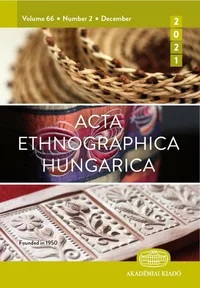The Contribution of Ernő Tárkány Szücs to Hungarian Ethnography
The Contribution of Ernő Tárkány Szücs to Hungarian Ethnography
Author(s): Attila PALÁDI-KOVÁCSSubject(s): History of Law, Cultural Anthropology / Ethnology
Published by: Akadémiai Kiadó
Keywords: legal inheritance customs; peasant wills; branding marks; local social law; legal folk customs in relation to mining and sheep farming
Summary/Abstract: Ernő Tárkány Szücs was a prominent figure in Hungarian social ethnography between 1944 and 1984. His involvement in the movement for collecting legal folk customs began as a university student in 1941. Among his professors and mentors, he was particularly influenced by György Bónis, Károly Viski, and József Venczel. His first large-scale study, published in 1944, was a presentation of legal folklore from the village of Mártély. At the same time, he investigated the folk laws related to sheep farming and the legal customs with respect to inheritance in the Hungarian villages in Transylvania. He published two substantial volumes containing the wills of peasant citizens of Hódmezővásárhely written between 1730 and 1796, and later the testaments of serf farmers from the town of Makó. He published a data collection containing around 10,000 ownership certificates and an analytical study in German on the branding of horses and cattle, accompanied by illustrations. He carried out research on the legal customs associated with Hungarian mining in the 17th to 19th centuries and elaborated Hungary's draft mining law. His principal work — on Hungarian Legal Folk Customs — is a substantial, comprehensive, and incomparably rich corpus of legal ethnography and the history of law. His work also gained recognition abroad: he spoke at many international conferences and was elected as a member of several international organizations
Journal: Acta Ethnographica Hungarica
- Issue Year: 67/2022
- Issue No: 1
- Page Range: 27-36
- Page Count: 10
- Language: English

